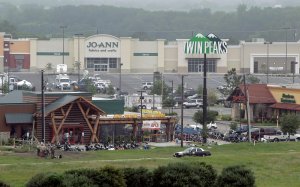Nearly four years after nine people were killed and at least 20 injured during a biker gang shootout in the parking lot of a Twin Peaks restaurant in Texas, the McLennan County criminal district attorney’s office is dismissing charges against the 24 remaining defendants.
The Twin Peaks shootout in Waco in May 2015 was the violent culmination of a feud between the Bandidos and the Cossacks biker clubs and resulted in the unprecedented roundup by authorities of 177 bikers. Months later, 154 club members would be indicted of engaging in organized criminal conduct in connection with one of the most notorious chapters in outlaw biker history. The charges for all but two dozen defendants were eventually dismissed.
In November 2017, the lone Waco case to reach a jury ended in a dramatic mistrial. Jurors could not reach a unanimous verdict in the case of Jake Carrizal, the president of the Dallas Bandidos chapter.
Barry Johnson, the McLennen County criminal district attorney who has been critical of the way his predecessor handled the prosecutions, said
Tuesday that he was dismissing the remaining cases.
“I believe that any effort to charge and prosecute these individual charges at this time would only result in further waste of time, effort and resources of the McLennan County judicial system and place a further unfair burden on the taxpayers of McLennan County,” he said.
Johnson said the 24 defendants were indicted on a charge of riot, a class B misdemeanor punishable by up to 180 days in jail.
“I believe that should I elect to proceed with the prosecution of these 24 individuals on the charge of riot, and should my office obtain guilty verdicts as to one or more individuals, there are a number of assertions of error that will be raised on appeal after any such convictions,” he said.
Johnson, who took over as DA in January, said convictions would likely be set aside on appeal and “the expended resources of our judicial system, and more importantly, the expended tax dollars of our McLennan County taxpayers, would have been wasted.”
“I do not have the degree of confidence that I believe necessary to justify the large expenditures of judicial and law enforcement time and resources, as well as taxpayer dollars, over a period of the next several years, while running a significant risk of having the convictions set aside at a time far in the future by an appellate court,” the prosecutor said in the statement.

In the November 2017 mistrial, Carrizal faced two counts of engaging in organized criminal activity and one count of directing the actions of a criminal gang. A mistrial was declared on all three counts after the jury was unable to reach unanimous verdicts on any of the counts.
Carrizal, the president of the Dallas Bandidos chapter, is the first biker whose case has seen the inside of a Waco courtroom. Carrizal faced up to life in prison if he was convicted. Prosecutors have faced scathing criticism from the bikers, attorneys and families of those arrested for taking so long to begin the trials.
” … in America, you are supposed to investigate first and charge later; not the other way around,” attorney Clint Broden, who represented three bikers, said in a statement last year.
Carrizal, who spoke exclusively with CNN in 2016 for the documentary “Biker Brawl: Inside the Texas Shootout, ” said the Bandidos were ambushed and surprised by the Cossacks bikers — who weren’t expected to be at the Twin Peaks restaurant that day.
“We were ambushed in a war zone,” Carrizal told CNN. “I had never been that scared in my life.”
In Carrizal’s interview with CNN and with investigators after the brawl, the Bandidos biker said he didn’t have a firearm. But prosecutors presented evidence that Carrizal had a small handgun that he fired twice at a Cossacks biker who had fired shots at him while he was on the ground. Carrizal said he acted in self defense.
“I am a Bandido. I’m not a criminal,” Carrizal told the jury during almost two days of testimony in the case.
Meeting on ‘sacred ground’
Law enforcement investigators said 1% of clubs, especially the Bandidos, operate as criminal street gangs and live “to instill fear and intimidation” in their rivals.
The bikers showed up at the Twin Peaks that day to attend a Confederation of Clubs meeting. This is an organization that routinely brings bikers together to talk about motorcycle-related issues. One biker described these meetings as “sacred ground” and not the place to settle conflicts between rival bikers.
The Bandidos argue the Cossacks are not members of the Confederation of Clubs and had no reason to show up at the Twin Peaks restaurant that Sunday afternoon. The Cossacks have said they were there that day to make peace with the Bandidos.
In May 2018, in a case against the Bandidos leadership that was not part of the Waco shootout investigation, the top two leaders of the motorcycle club were found guilty on 13 federal charges.
Bandidos National President Jeffrey Pike, 62, and Vice President Xavier Portillo, 58, were convicted by a jury in San Antonio after a nearly three-month trial.
Jurors convicted the leaders of the motorcycle organization of racketeering, drug trafficking, conspiracy to commit murder and extortion charges.













